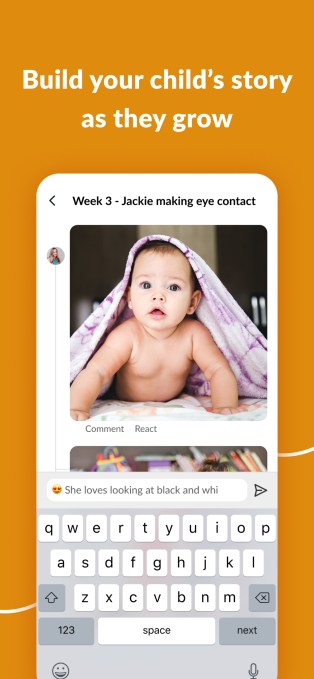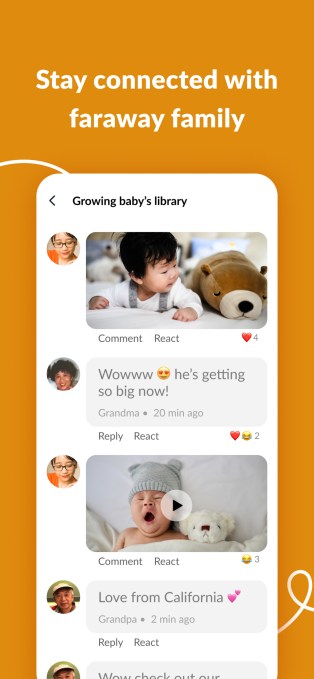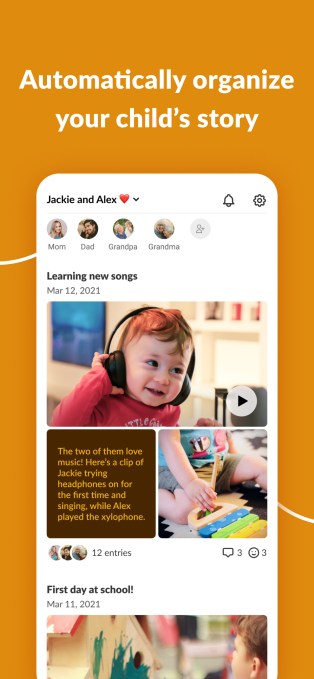A women-led startup called Honeycomb is launching its private social app for families, backed by $4 million in seed funding led by Peter Boyce at Stellation Capital. Now out of private beta, the app offers families a way to curate and share their favorite moments and memories via their smartphone as an alternative to using a more public social media platform, like Facebook, or group texting, where photos and videos can be easily lost.
Of note, Honeycomb is the first startup Boyce is backing with his new firm, Stellation Capital, founded this year after he left General Catalyst. Other participants in the round include DCM (Kyle Lui), Bling Capital (Ben Ling) and Precursor Ventures (Charles Hudson), as well as angels including Ancestry CEO Deborah Liu, Giphy founder Alex Chung and Twitter VP of Engineering Nick Caldwell, formerly of Reddit.
Honeycomb itself was co-founded by CEO Amelia Lin, previously of Udacity and Optimizely, and former Instagram product manager Nicole Wee. The co-founders had been inspired to create an app that would connect families through private social networking, but had originally approached this with a different product, called Saga. Their first app was a social audio experience that let families capture and record their life stories — like tales about how the grandparents first met, for example, or even just birthday wishes for a child that can be listened to later, as a sort of audio diary.
But while that app received plenty of early press, it wasn’t necessarily what families wanted. Instead, the team kept hearing from early adopters how they wanted to store their photos and videos, too, not just audio recordings. So the team pivoted and rebranded their app as Honeycomb this past fall.

The new experience launched into private beta testing in September, offering a way for families to save their favorite photos and videos, which are combined with text and turned into a digital story of sorts. The experience as it stands today isn’t necessarily that much more robust compared with a group chat over iMessage, for instance, but it does offer an easy way to go back to revisit older shares which can be difficult to do when using text messaging. It also lets users set a reminder so they’ll remember to curate their favorite memories from the day — a feature that’s probably best for new parents who rapidly fill their phones with dozens of new photos daily as their baby hits new milestones.

“We help it become a really easy daily ritual of sorting through the best memories of the day,” explains Lin. “You pick your favorites and they automatically get compiled into this story that’s not only shared with your family, but also saved in this collection forever,” she says. However, she notes, the experience is not meant to replace users’ existing photo services, like Google Photos, Apple’s Photos app or Dropbox, where people back up and save all their content — including duplicate photos and those that didn’t quite turn out well.
“I don’t think of that as being the curated, beautiful place that I interact with my family,” Lin says. “And then [users may have] Facebook and Instagram, but that feels really public to put my baby photos out on.” Honeycomb, by comparison, is private by default.
“Only your family gets to choose who is in here, and I do think that is a pretty different philosophical approach,” says Lin. Plus, she notes, “we don’t sell your photos or your data to third parties.”

Honeycomb is also different from mainstream social apps because it will be a subscription-based service, not one that’s monetized through advertising. For now, however, the app is free as the startup gets the new app off the ground.
The company is working to address how to include the family’s elder users into the platform, which may include adding support for exporting its content to be shared elsewhere. But the team thinks that the draw of new baby and kid photos may be the push grandma or grandpa needs to figure out how to put the app on their phone — even if they’re not technically savvy.
After users download Honeycomb they’ll first gain access to a basic set of features. But soon, they’ll be opted into the new beta, which includes a more engaging story format for sharing memories with family and friends. (This opt-in won’t happen immediately, but is now rolling out, the company clarifies.)
The idea to return to human curation, not AI, to help users find their best photos and videos is certainly a different idea these days. But whether or not people want to sort through their daily snaps — especially after that “new baby” buzz wears off — remains to be seen.

Besides, AI can be useful. (Presumably, a smart AI would have known to feature a photo of a person, not a toy, as the cover photo after I made a birthday photo album in the app). AI can also help users automatically sort through photos by discarding those with poor lighting or bad exposure.
What users don’t want, generally, is having an AI have the final say on their “best” photos or putting together albums without any context about their lives and what they think is important. And they don’t want AI reminding them through automated “memories” of times they’d rather forget.
The best solution, however, may be a balance between AI and manual curation, but done in a private, social environment.
Because Honeycomb is effectively a new app, the startup isn’t sharing user figures. But Lin notes that engagement tripled since pivoting from Saga.
“Honeycomb is a truly mission-driven company, using technology to advance one of our most basic and long-standing human desires: to archive and share our family’s memories,” said Stellation’s Peter Boyce about his investment in the startup. “Honeycomb has the potential to bring the family album into the 21st century. It’s rare to find such a large problem space that is ripe for a step-function change in innovation. Families are ready for the next evolution of social apps, one that is meant to be personal and intimate, and this team is building it,” he added.
Honeycomb, now a team of seven, is planning to use the new funds for hiring, including engineers, who will work in-person from its San Mateo office space. It expects to add around 10 people.































Comment